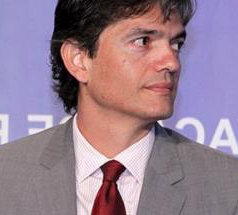BRASILIA, (Reuters) – The biggest threat to Brazilian President Dilma Rousseff’s hold on office may come not from a corruption scandal that has ensnared the country’s business and political elite but from a less-heralded probe into accounting practices led by a computer science graduate turned lawyer.

de Oliveira
Julio Marcelo de Oliveira, a prosecutor at Brazil’s Federal Accounts Court, known as the TCU, says Rousseff broke the nation’s fiscal responsibility law by systematically delaying repayments to Brazilian lenders for advancing money to pay for social programs such as unemployment insurance. The delay in repayments resulted in the nation’s fiscal account appearing to be healthier than it was.
The practice, known as “backpedaling,” was intended to show spending wasn’t as high as it was and bolster Rousseff’s re-election bid. The TCU is Brazil’s highest fiscal accounting court, in charge of reviewing public finances. The Brazilian constitution calls for the impeachment and removal from office of a president who breaches the fiscal responsibility law.
At issue is Oliviera’s claim that Rousseff’s government dragged its feet in repaying some 40 billion reais ($11.6 billion) in social program funding obtained from state-run lenders in 2012 and 2013. Though other Brazilian governments delayed payments in the past, it was never done to this magnitude, he said.
The government has denied any irregularities, arguing that it followed the law in its accounting practices last year. The government acknowledged it delayed repaying the state lenders because of limited cash flow at the time, just as other administrations did in the past without breaching the law. The government is paying those arrears, reducing its savings this year and forcing authorities to slash key fiscal targets.
“I never imaged this was going to turn into something this big,” said Oliveira, 46. “I represented other cases that I thought were more important… but this has taken another political dimension.”
The accusations have emboldened Rousseff’s opponents to call for her impeachment in Congress.
“Without a doubt the TCU case is the most solid one of them all … it serves as the basis for an impeachment,” said Paulo Kramer, a Brasilia-based political consultant. “The political climate is deteriorating so fast that there is a real risk she will not finish her term.”
The “backpedaling” is considered the main argument in an expected rejection of Rousseff’s handling of the public finances by the TCU in its annual review of the government’s 2014 accounts.
The TCU’s ruling is not judicially binding, but may help Congress decide whether Rousseff violated fiscal rules, paving the way for what would be the country’s first effort to oust a sitting president since 1992. The TCU is expected to rule in late August.
There are 12 impeachment requests in Congress, but they all lack the legal basis to move forward, congressional aides told Reuters. The accounting case is different given that it would be based on a simple determination of whether Rousseff’s government violated the country’s fiscal responsibility law.
Though Rousseff holds enough support in Congress to avoid an impeachment for now, her sway over allied lawmakers is ebbing as dozens are probed in the bribery investigation dubbed “Operation Car Wash,” named for a Brasilia gas station where some of the alleged money laundering took place. Some lawmakers have blamed Rousseff for allegedly directing the investigation against them.
LOSING SUPPORT
“A TCU ruling makes an impeachment request inevitable,” said Carlos Sampaio, leader of the main opposition party, PSDB, in the Lower House of Congress. “Nothing could be better for the country than to see Rousseff step down.”
The PSDB is also challenging Rousseff’s re-election with the country’s electoral tribunal, accusing her of receiving money from a multi-billion dollar corruption scandal at state-run oil giant Petrobras. The opposition contends the funds may have helped her eke out a victory over their candidate, senator Aecio Neves, last year.
The Petrobras corruption investigation, Brazil’s biggest ever, has led to the arrest of the nation’s most senior engineering executives, accused of participating in a cartel that fixed prices on contracts.
For Rousseff, a technocrat who had never run for public office before ascending to the presidency in 2011, the scandal compounds the political damage from an economy heading into its worst recession in 25 years.
Her party supporters say the impeachment bids are a veiled coup attempt by the PSDB to take over the presidency.
In an opinion piece published on Friday, daily O Globo, one of the country’s best-read newspapers, called on lawmakers to defuse the political crisis, signaling it does not support impeachment.
“It needs to be understood that the political crisis, which erodes the president’s capacity to govern, is fueling the economic crisis,” according to the column.
CAR WASH CONNECTION
Oliveira’s charges of fiscal irregularities threaten to further complicate Rousseff’s fading agenda, especially an austerity package aimed at saving Brazil’s investment-grade rating.
